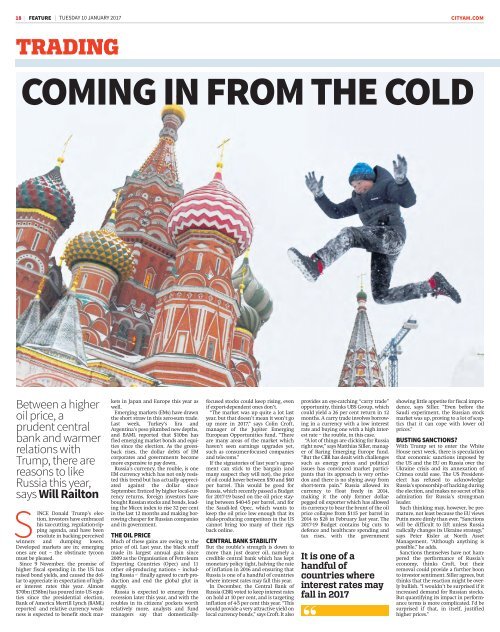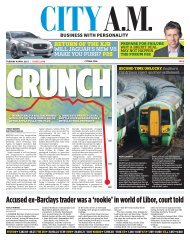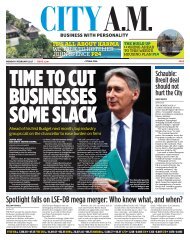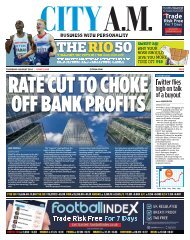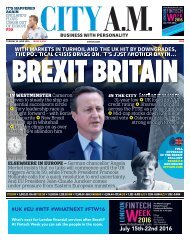Create successful ePaper yourself
Turn your PDF publications into a flip-book with our unique Google optimized e-Paper software.
18 FEATURE TUESDAY 10 JANUARY 2017<br />
CITYAM.COM<br />
TRADING<br />
COMING IN FROM THE COLD<br />
Between a higher<br />
oil price, a<br />
prudent central<br />
bank and warmer<br />
relations with<br />
Trump, there are<br />
reasons to like<br />
Russia this year,<br />
says Will Railton<br />
SINCE Donald Trump’s election,<br />
investors have embraced<br />
his tax-cutting, regulation-ripping<br />
agenda, and have been<br />
resolute in backing perceived<br />
winners and dumping losers.<br />
Developed markets are in; emerging<br />
ones are out – the obstinate tycoon<br />
must be pleased.<br />
Since 9 November, the promise of<br />
higher fiscal spending in the US has<br />
raised bond yields, and caused the dollar<br />
to appreciate in expectation of higher<br />
interest rates this year. Almost<br />
$70bn (£58bn) has poured into US equities<br />
since the presidential election,<br />
Bank of America Merrill Lynch (BAML)<br />
reported and relative currency weakness<br />
is expected to benefit stock markets<br />
in Japan and Europe this year as<br />
well.<br />
Emerging markets (EMs) have drawn<br />
the short straw in this zero-sum trade.<br />
Last week, Turkey’s lira and<br />
Argentina’s peso plumbed new depths,<br />
and BAML reported that $10bn has<br />
fled emerging market bonds and equities<br />
since the election. As the greenback<br />
rises, the dollar debts of EM<br />
corporates and governments become<br />
more expensive to pay down.<br />
Russia’s currency, the rouble, is one<br />
EM currency which has not only resisted<br />
this trend but has actually appreciated<br />
against the dollar since<br />
September. Enticed by higher local-currency<br />
returns, foreign investors have<br />
bought Russian stocks and bonds, leading<br />
the Micex index to rise 32 per cent<br />
in the last 12 months and making borrowing<br />
cheaper for Russian companies<br />
and its government.<br />
THE OIL PRICE<br />
Much of these gains are owing to the<br />
price of oil. Last year, the black stuff<br />
made its largest annual gain since<br />
2009 as the Organisation of Petroleum<br />
Exporting Countries (Opec) and 11<br />
other oil-producing nations – including<br />
Russia – finally agreed to curb production<br />
and end the global glut in<br />
supply.<br />
Russia is expected to emerge from<br />
recession later this year, and with the<br />
roubles in its citizens’ pockets worth<br />
relatively more, analysts and fund<br />
managers say that domestically-<br />
focused stocks could keep rising, even<br />
if export-dependent ones don’t.<br />
“The market was up quite a lot last<br />
year, but that doesn’t mean it won’t go<br />
up more in 2017,” says Colin Croft,<br />
manager of the Jupiter Emerging<br />
European Opportunities fund. “There<br />
are many areas of the market which<br />
haven’t seen earnings upgrades yet,<br />
such as consumer-focused companies<br />
and telecoms.”<br />
If the signatories of last year’s agreement<br />
can stick to the bargain (and<br />
many suspect they will not), the price<br />
of oil could hover between $50 and $60<br />
per barrel. This would be good for<br />
Russia, which recently passed a Budget<br />
for 2017-19 based on the oil price staying<br />
between $40-45 per barrel, and for<br />
the Saudi-led Opec, which wants to<br />
keep the oil price low enough that its<br />
shale-producing competitors in the US<br />
cannot bring too many of their rigs<br />
back online.<br />
CENTRAL BANK STABILITY<br />
But the rouble’s strength is down to<br />
more than just dearer oil, namely a<br />
credible central bank which has kept<br />
monetary policy tight, halving the rate<br />
of inflation in 2016 and ensuring that<br />
Russia is one of a handful of countries<br />
where interest rates may fall this year.<br />
In December, the Central Bank of<br />
Russia (CBR) voted to keep interest rates<br />
on hold at 10 per cent, and is targeting<br />
inflation of 4-5 per cent this year. “This<br />
would provide a very attractive yield on<br />
local currency bonds,” says Croft. It also<br />
provides an eye-catching “carry trade”<br />
opportunity, thinks UBS Group, which<br />
could yield a 26 per cent return in 12<br />
months. A carry trade involves borrowing<br />
in a currency with a low interest<br />
rate and buying one with a high interest<br />
rate – the rouble, in this case.<br />
“A lot of things are clicking for Russia<br />
right now,” says Matthias Siller, manager<br />
of Baring Emerging Europe fund.<br />
“But the CBR has dealt with challenges<br />
such as energy prices and political<br />
issues has convinced market participants<br />
that its approach is very orthodox<br />
and there is no shying away from<br />
short-term pain.” Russia allowed its<br />
currency to float freely in 2014,<br />
making it the only former dollarpegged<br />
oil exporter which has allowed<br />
its currency to bear the brunt of the oil<br />
price collapse from $115 per barrel in<br />
2014 to $28 in February last year. The<br />
2017-19 Budget contains big cuts to<br />
defence and healthcare spending and<br />
tax rises, with the government<br />
It is one of a<br />
handful of<br />
countries where<br />
interest rates may<br />
fall in 2017<br />
showing little appetite for fiscal imprudence,<br />
says Siller. “Even before the<br />
Saudi experiment, the Russian stock<br />
market was up, proving to a lot of sceptics<br />
that it can cope with lower oil<br />
prices.”<br />
BUSTING SANCTIONS?<br />
With Trump set to enter the White<br />
House next week, there is speculation<br />
that economic sanctions imposed by<br />
the US and the EU on Russia over the<br />
Ukraine crisis and its annexation of<br />
Crimea could ease. The US Presidentelect<br />
has refused to acknowledge<br />
Russia’s sponsorship of hacking during<br />
the election, and makes no secret of his<br />
admiration for Russia’s strong-man<br />
leader.<br />
Such thinking may, however, be premature,<br />
not least because the EU views<br />
Putin more dimly than ever. “Sanctions<br />
will be difficult to lift unless Russia<br />
radically changes its Ukraine strategy,”<br />
says Peter Kisler at North Asset<br />
Management. “Although anything is<br />
possible,” he adds.<br />
Sanctions themselves have not hampered<br />
the performance of Russia’s<br />
economy, thinks Croft, but their<br />
removal could provide a further boon<br />
to investor sentiment. Siller agrees, but<br />
thinks that the reaction might be overly<br />
bullish. “I wouldn’t be surprised if it<br />
increased demand for Russian stocks.<br />
But quantifying its impact in performance<br />
terms is more complicated. I’d be<br />
surprised if that, in itself, justified<br />
higher prices.”


